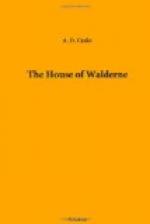One day he especially dreaded. It was the anniversary of the fatal day when he had slain Sir Casper de Fievrault, for never had that day passed unmarked, never did his conscience fail to record his adversary’s dying day. It was strange that, in those fighting days, a man should feel the death of a foe so keenly, and Sir Roger had slain many in fair fight. But this particular case was exceptional. It had been on a day of solemn truce that, maddened by a real or supposed insult, he had forced his foe to fight, and met objections by a blow. And they were both sworn soldiers of the Cross, pledged not to engage in a less holy warfare. Thence the remorse and the dread penalty; under such an one many a man has sunk to the grave {33}. Therefore, as we have said, he dreaded the advent of the fatal day.
It came, and Sir Roger faced the ordeal alone in his cell, when, lo! in the dead hour of the night, his tormentor appeared, but no longer armed with his terrors. His face was changed, his features resigned and peaceful.
“I come but to bid thee farewell, for so long as thou art in the flesh. Thy son has fulfilled thy vow. He has placed my sword on the altar of the Holy Sepulchre, and I am released. Thou hast thy reward and my forgiveness. May we meet where strife is no more! Him thou shalt yet see in the flesh, as thy reward.”
And he disappeared.
Was it a dream? Well, if so, it gave the father not merely hope but certainty. He was happy at last, and waited patiently the fulfilment of the vision.
_______________________________________________________
_______
It was the night before the battle. Evensong had been sung with more than usual solemnity. It had been attended by King Henry in person, who was very devout, and by his son and brother, and all their train; and special prayers had been added, suitable to the crisis, to the God of armies and Lord of battles.
So soon as the service began it was customary to shut the great gates of the priory. Just as the boom of the bell had ceased, and the gates were closing, a knight strode up, who had but just arrived, as he said, from over sea, and had but tarried to put his horse in good keeping.
He was allowed to pass, not without scrutiny.
“Art thou with us or against us?” said the warder.
“I am a soldier of the Cross,” was the reply, and a few more words were whispered in the ear.
The warder started back.
“Verily thy father’s heart will be glad,” he exclaimed.
Brother Roger, now so called, sat in his cell. He was little changed; but in place of the dread, the ghastly dread, which had once given his face a haggard and weird look, resignation had stamped his features with a softer expression.
The dread shadow, whether born of remorse or otherwise, had been removed. No more did the dead lord of Fievrault trouble him; but the old monk, erst the venturous soldier, felt as if he had purchased this remission with the banishment of his dear son, as if he had given “the first born of his body for the sin of his soul.”




